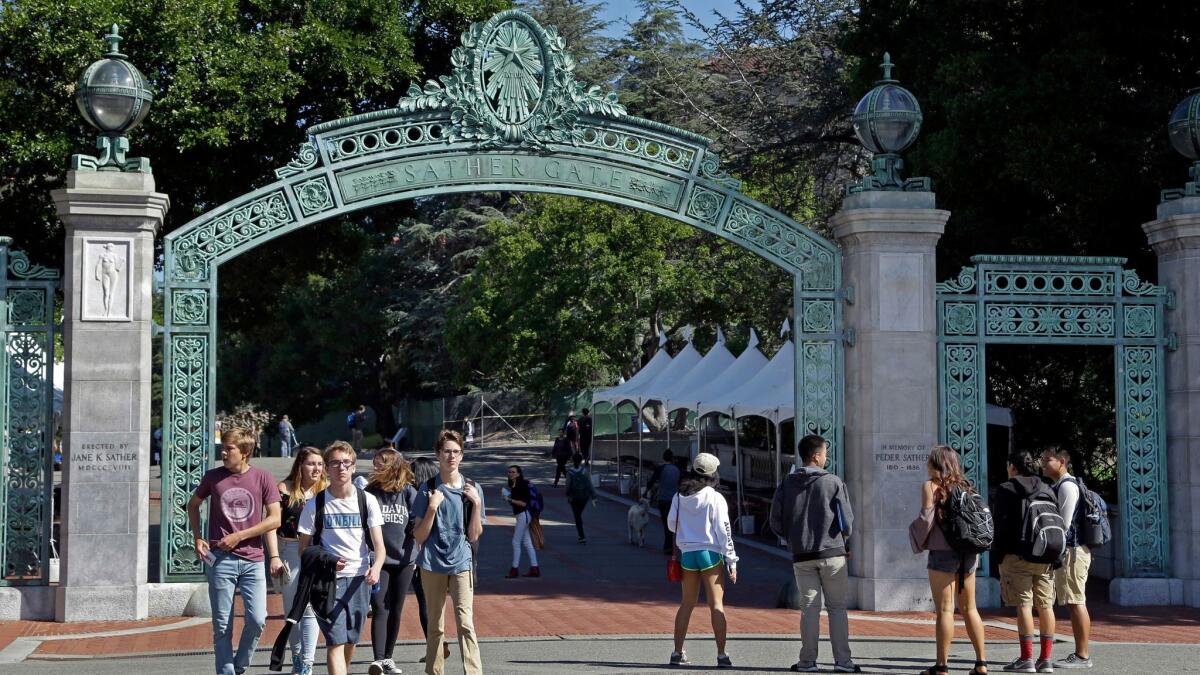Op-Ed: Republicans don’t trust higher ed. That’s a problem for liberal academics

- Share via
Only 36% of Republicans, according to the Pew Research Center, believe colleges and universities have a positive effect on the way things are going in the country, versus 58% who say they have a negative effect. Among Democrats, those figures are 72% and 19%, respectively. That finding represents a crisis.
For it to be a crisis does not depend on you having any conservative sympathies. For this to be a crisis requires only that you recognize that the GOP is one of two major political parties in American life, and that Republicans’ lack of faith in higher education will have practical consequences.
Further, it helps if you recognize that, in the present era, Republicans dominate American governance, with control of the House, Senate, presidency and crucially for our purposes, a significant majority of the country’s statehouses and governor’s mansions. They also have built a machine for state-level political elections that ensures that they will likely control many state legislatures for years to come.
In my network of professional academics, almost no one recognizes that our lopsided liberalism presents a threat to academia itself.
As an academic, I am increasingly convinced that a mass defunding of public higher education is coming to an unprecedented degree and at an unprecedented scale. People enjoy telling me that this has already occurred — that state support of our public universities has already declined precipitously. But things can always get worse, much worse.
And given the endless controversies on college campuses in which conservative speakers get shut out and conservative students feel silenced, the public relations work is being done for the enemies of public education by those within the institutions themselves.
Who’s to blame for the fact that so few Republicans see the value in universities? The conservative media must accept some responsibility for encouraging its audiences to doubt expertise; so must those in the mainstream media who amplify every leftist kerfuffle on campus and make it seem as though trigger warnings are now at the center of college life.
But academics are at fault, too, because we’ve pushed mainstream conservatism out of our institutions. Sociologists Neil Gross and Solon Simmons have found that about half of professors identify as liberal, versus only 14% who identify as Republican. (At the time of their study, in 2006, only a fifth of American adults described themselves as liberal.)
In “What’s Liberal About the Liberal Arts?” Michael Berube describes and defends a philosophy of non-coercion and intellectual pluralism that isn’t just an intellectual curiosity, but an actual ethos that he and other professors live by. I grew up believing that most professors lived by that ethos. I don’t anymore. And when I suggest it’s a problem that academics are so overwhelmingly liberal, I get astonished reactions. “You actually think conservatives should feel welcome on campus?”
In my network of professional academics, almost no one recognizes that our lopsided liberalism presents a threat to academia itself. Many would reply to the Pew Research Center’s findings with glee. They would tell you that they don’t want the support of Republicans. My fellow academics won’t grapple with the simple, pragmatic realities of political power and how it threatens vulnerable institutions whose funding is in doubt. That’s because there is no professional or social incentive in the academy to think strategically or to engage with the world beyond campus.
Instead, all of the incentives point toward affirming one’s position in the aristocracy of the academy. There are no repercussions to ignoring how the university and its subsidiary departments function in our broader society, at least not in the humanities and, for the most part, not in the social sciences either.
Universities make up a powerful lobbying bloc, and they have proved to be durable institutions. I don’t think you’ll see many flagship institutions shuttered soon. But an acceleration of the deprofessionalization of the university teaching corps through part-time adjuncts? Shuttering departments such as Women’s Studies or similar? Passing harsh restrictions on campus groups and how they can organize? That’s coming, and our own behavior as academics will make it easier for reactionary power, every step of the way.
Our public universities are under massive pressure and at immense risk, and those who should be defenders of public universities still don’t understand that they’ve created the conditions for their destruction.
Fredrik deBoer is a writer and academic at Brooklyn College in the City University of New York.
Follow the Opinion section on Twitter @latimesopinion or Facebook.
More to Read
A cure for the common opinion
Get thought-provoking perspectives with our weekly newsletter.
You may occasionally receive promotional content from the Los Angeles Times.










